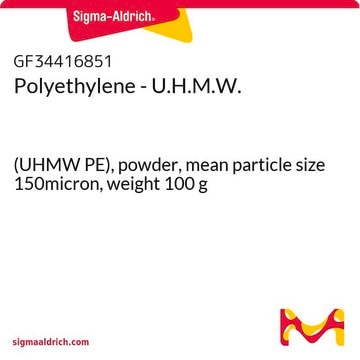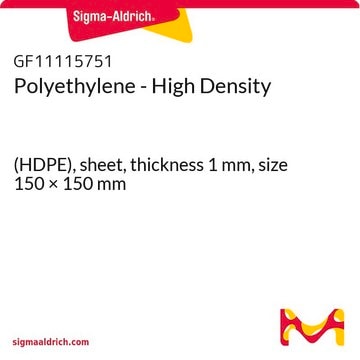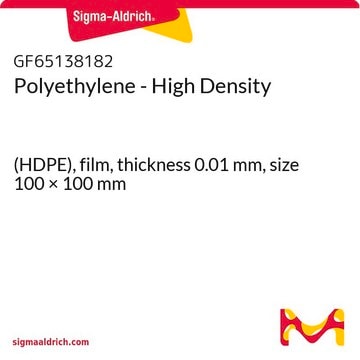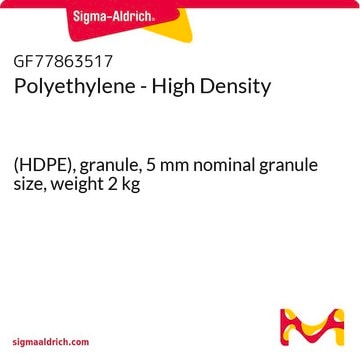547999
Polyethylene
High density, melt index 2.2 g/10 min (190 °C/2.16kg)
Sign Into View Organizational & Contract Pricing
All Photos(2)
About This Item
Linear Formula:
H(CH2CH2)nH
CAS Number:
MDL number:
UNSPSC Code:
12162002
PubChem Substance ID:
NACRES:
NA.25
Recommended Products
Quality Level
form
pellets
melt index
2.2 g/10 min (190 °C/2.16kg)
hardness
65 (Shore D, ASTM D 2240)
transition temp
softening point 123 °C (Vicat, ASTM D 1525)
density
(high density)
InChI
1S/C2H4/c1-2/h1-2H2
InChI key
VGGSQFUCUMXWEO-UHFFFAOYSA-N
Looking for similar products? Visit Product Comparison Guide
Application
Typical applications included specialty injection molded parts.
Features and Benefits
Excellent low temperature impact strength and environmental stress-crack resistance.
Storage Class Code
11 - Combustible Solids
WGK
WGK 3
Flash Point(F)
Not applicable
Flash Point(C)
Not applicable
Personal Protective Equipment
dust mask type N95 (US), Eyeshields, Gloves
Choose from one of the most recent versions:
Already Own This Product?
Find documentation for the products that you have recently purchased in the Document Library.
Customers Also Viewed
Ryan M Baxter et al.
Journal of biomedical materials research. Part B, Applied biomaterials, 101(3), 467-475 (2013-02-26)
Despite the widespread implementation of highly cross-linked polyethylene (HXLPE) liners to reduce the clinical incidence of osteolysis, it is not known if the improved wear resistance will outweigh the inflammatory potential of HXLPE wear debris generated in vivo. Thus, we
Eliandra Mirlei Rossi et al.
Journal of infection in developing countries, 7(3), 229-234 (2013-03-16)
Contaminated sponges might lead to cross-contamination in kitchens since they can transfer microorganisms to surfaces where microorganisms can survive for hours or days and contaminate food. The main objective of this study was to evaluate the transfer and the survival
Maria C S Inacio et al.
Acta orthopaedica, 84(2), 145-152 (2013-03-15)
There is no substantial clinical evidence for the superiority of alternative bearings in total knee arthroplasty (TKA). We compared the short-term revision risk in alternative surface bearing knees (oxidized zirconium (OZ) femoral implants or highly crosslinked polyethylene (HXLPE) inserts) with
Thibault Honegger et al.
Lab on a chip, 13(8), 1538-1545 (2013-02-23)
In this paper, we introduce a dielectrophoresis (DEP)-based handling method that allows fine 3D manipulation of beads in suspension using a lab on a chip device. The device consists of two layers of linear electrodes on the top and bottom
The fouling hydroid Ectopleura larynx: a lack of effect of next generation antifouling technologies.
Nina Bloecher et al.
Biofouling, 29(3), 237-246 (2013-02-27)
The hydroid Ectopleura larynx is one of the main fouling organisms on salmon aquaculture cages in Norway; this study investigated novel surface materials and microtopographies to deter its settlement. The settlement preferences of hydroid larvae for 12 materials with wettabilities
Our team of scientists has experience in all areas of research including Life Science, Material Science, Chemical Synthesis, Chromatography, Analytical and many others.
Contact Technical Service



